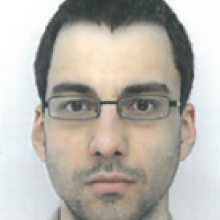Evaluation and Modeling with the Therapeutic Effects Group
Members

Maîtresse de conférences - praticienne hospitalière
UCBL
Tel: 04 72 11 94 07
Maître de conférences - praticien hospitalier
UCBL
Tel: 33 04 72 32 34 87

Professeur des universités - médecin généraliste
UCBL
Tel: 04 78 74 18 18

Maîtresse de conférences
UCBL
Tel: 33 04 78 78 57 83

Professeure des universités - médecin généraliste
UCBL
Tel: 04 78 77 72 86

Professeur d'université - praticien hospitalier
UCBL
Tel: 04 72 44 81 42
Doctorante
HCL
Professeur d'université - praticien hospitalier
UCBL
Assistant hospitalier universitaire
UCBL

Professeur d'université - praticien hospitalier
UCBL
Tel: 33 04 72 16 80 99

Praticien hospitalier
HCL
Tel: 04 72 44 81 42

Professeur d'université - praticien hospitalier émérite
UCBL

Professeur d'université - praticien hospitalier
UCBL
Tel: 04 27 85 77 32

Professeur d'université - praticien hospitalier
UCBL
Tel: 33 04 78 86 33 01

Post-doc
UCBL

Maîtresse de conférences - praticienne hospitalière
UCBL
Doctorante
UCBL
Maître de conférences - praticien hospitalier
UCBL
Tel: 04 72 11 94 20

Professeur d'université - praticien hospitalier
UCBL
Tel: 33 04 72 12 94 37
Doctorante
UCBL
Tel: 04 72 44 81 42
Doctorante
HCL
EMET presentation
The EMET team brings together doctors, pharmacists and research professors specializing in the evaluation and use of drug and non-drug therapies, around a single project built on two axes:
- the evaluation of therapies in clinical trials or observational studies;
- the construction of explanatory and predictive models, to better understand and therefore predict the effect of therapies, simulate their impacts at the individual and population level, and improve the innovation paradigm.
The EMET team is therefore part of two major dynamics in therapy: analysis of the level of evidence and precision medicine.
The fields of application are cardiovascular and metabolic diseases, primary care medicine, rare pediatric diseases (including genetic and autoimmune diseases), oncology and infectious diseases.
EMET members implement approaches using different mathematical models: direct comparison and network meta-analysis, pharmacokinetic/pharmacodynamic analysis, Bayesian networks and machine learning.
Education
The EMET team is specially involved in the teaching of pharmacology and therapeutics and the modeling of the treatment effect through the coordination of the Masters 2 Clinical Evaluation (EC) and Pharmacology modeling and clinical trials (PHAME), Interpretation of Therapeutic Trials (IET), Training of investigators in clinical drug trials (FIEC) and Training of clinical research assistants and clinical study technicians (FARCTEC). Teacher-researchers are also involved in the first (pharmacology), second (pharmacology / therapeutics, pharmacy) and third cycles (general medicine, pediatrics, internal medicine) in health training courses.
Society involvement
The members of the EMET team through their work and their interactions with the other components of the LBBE, National societies, governmental (HAS) or international (EMA) agencies, and the Hospices Civils de Lyon, are invested in current societal issues: rationalization of the use of health product resources, research ethics, gender equality, rationality of approaches in analyzing the diversity of human populations.
Publications
Display of 571 to 600 publications on 648 in total
Both extrauterine and intrauterine growth restriction impair renal function in children born very preterm
Kidney International . 76 ( 4 ) : 445-452
DOI: 10.1038/ki.2009.201
Journal article
see the publicationInterleukin 17 acts in synergy with B cell-activating factor to influence B cell biology and the pathophysiology of systemic lupus erythematosus
Nature Immunology . 10(7) : 778-788
Journal article
see the publicationVisual estimation of patients' right body weight in hospital: the more observers, the better?
Pharmacy World and Science . : 1-4
Journal article
see the publicationComment: Modification of Diet in Renal Disease and Modified Cockcroft-Gault Formulas in Predicting Aminoglycoside Elimination
Annals of Pharmacotherapy . 43 ( 6 ) : 1145-1146
DOI: 10.1345/aph.1L144a
Journal article
see the publication[Amikacin pharmacokinetics in adults: a variability that question the dose calculation based on weight].
Therapies . 64 ( 1 ) : 47-53
Journal article
see the publicationExploration of beneficial and deleterious effects of inflammation in stroke: dynamics of inflammation cells.
Philosophical Transactions of the Royal Society A: Mathematical, Physical and Engineering Sciences . 367 ( 1908 ) : 4699-4716
Journal article
see the publicationA mathematical approach to model stroke pathophysiology
International Heart Forum .
Conference paper
see the publicationExamples of the influence of the geometry on the propagation of progressive waves
Mathematical and Computer Modelling . 49 ( 11-12 ) : 2138-2144
Journal article
see the publicationNew surfactant protein C gene mutations associated with diffuse lung disease
Journal of Medical Genetics . 46 ( 7 ) : 490
Journal article
see the publicationCognitive Therapy versus Rogerian Supportive Therapy in Borderline Personality Disorder
Psychotherapy and Psychosomatics . 78(5) : 307-316
Journal article
see the publicationModélisation pharmacocinétique-pharmacodynamique et techniques de simulation appliquées à l’évaluation de stratégies thérapeutiques en infectiologie
Thesis
see the publicationA positioning pillow to improve lumbar puncture success rate in paediatric haematology-oncology patients: a randomized controlled trial
BMC Cancer . 9(21) : 1399-1406
Journal article
see the publicationFondements de l`évaluation des tests diagnostiques
Lecture critique d`article . 59 : 375-379
Journal article
see the publicationPrevention of dementia by antihypertensive drugs: how AT1-receptor-blockers and dihydropyridines better prevent dementia in hypertensive patients than thiazides and ACE-inhibitors.
Expert Review of Neurotherapeutics . 9 ( 9 ) : 1413-31
DOI: 10.1586/ern.09.89
Journal article
see the publicationRecueil systématique et actif des evènements indésirables médicamenteux chez les enfants admis aux urgences pédiatriques
Archives de Pédiatrie . 16(2) : 106-111
Journal article
see the publicationSCORE should be preferred to Framingham to predict cardiovascular death in French population
European Journal of Cardiovascular Prevention and Rehabilitation . 16(5) : 609-615
Journal article
see the publicationEvaluation of various gentamicin dosage regimens in geriatric patients: a simulation study
Fundamental & Clinical Pharmacology . -- : 1-5
Journal article
see the publicationModification of Diet in Renal Disease and Modified Cockcroft-Gault Formulas in Predicting Aminoglycoside Elimination
The Annals of Pharmacotherapy . 43 : 1143-1146
Journal article
see the publicationVariabilité pharmacocinétique intra-individuelle et traitement antibiotique prolongé
Médecine et Maladies Infectieuses (1971-2020) . 2859 : 38-41
Journal article
see the publicationPopulation Modeling and Monte Carlo Simulation Study of the Pharmacokinetics and Antituberculosis Pharmacodynamics of Rifampin in Lungs
Antimicrobial Agents and Chemotherapy . 53(7) : 2974-2981
Journal article
see the publicationPatient versus general practitioner perception of problems with treatment adherence in type 2 diabetes: From adherence to concordance
European Journal of General Practice . 15 ( 15 ) : 147-153
Journal article
see the publicationPatient versus general practitioner perception of problems with treatment adherence in type 2 diabetes: From adherence to concordance
European Journal of General Practice . 15 ( 3 ) : 147-153
Journal article
see the publicationPharmacocinétique de l'amikacine chez l'adulte : une hétérogénéité qui remet en cause le calcul de la dose basé sur le poids
Thérapie . 64 ( 1 ) : 189-194
Journal article
see the publicationCritique du modèle additif de l’essai clinique randomisé
Therapies . 63 ( 1 ) : 29-35
Journal article
see the publicationRenal hypersensitivity' to inulin and IgA nephropathy
Pediatric Nephrology . 23 ( 10 ) : 1883-1885
Journal article
see the publication‘Renal hypersensitivity' to inulin and IgA nephropathy
Pediatric Nephrology . 23(10) : 1883-1885
Journal article
see the publicationHypersensitivity to inulin : a rare and mostly benign event
American Journal of Kidney Diseases . 52(3) : 632-633
Journal article
see the publicationComment lire un article rapportant un test diagnostique?
Médecine . 1 : 1-3
Journal article
see the publicationCritique du modèle additif de l'essai clinique randomisé
Thérapie . 63 ( 1 ) : 29-35
Journal article
see the publicationA modelling approach to explore some hypotheses of the failure of neuroprotective trials in ischemic stroke patients.
Progress in Biophysics and Molecular Biology . 97 ( 1 ) : 60-78
Journal article
see the publication
You also, comment on this article